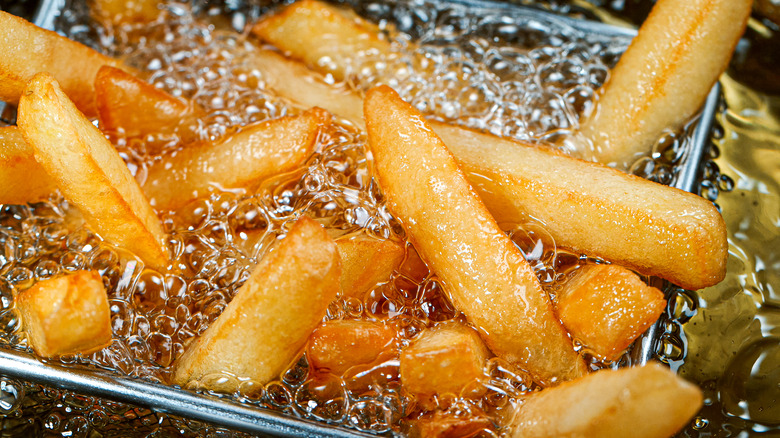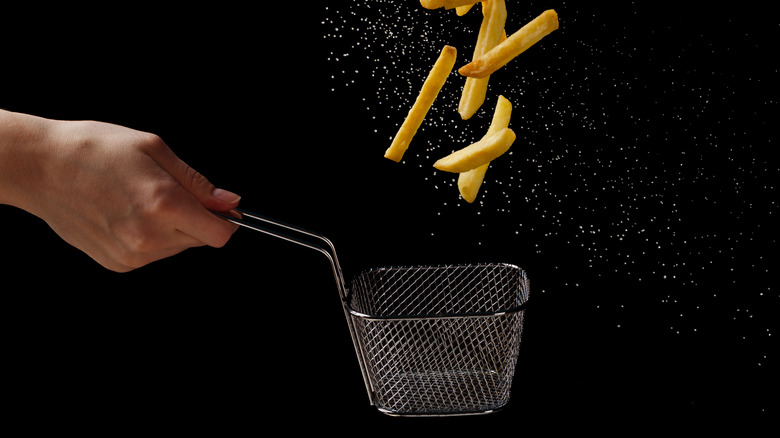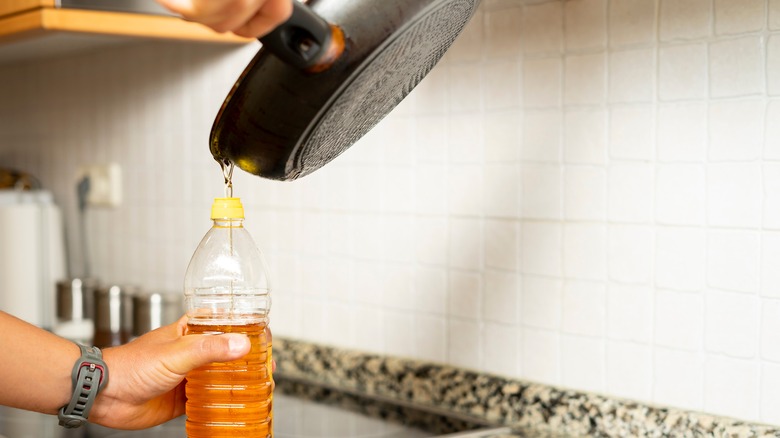Why You Should Never Use Salt In Hot Cooking Oil
Ever wonder why cooks on television wait until after their food is done frying to salt it? You would think salting your food beforehand would infuse flavor throughout, as marinades do for so many cuts of meat — but science says otherwise. Escoffier states that it's best to avoid salting before frying because salt lowers the smoke point of the oil.
When the smoke point of the oil is lower, it is unable to withstand high-temperature cooking. This can cause your food can become burnt and bitter tasting more quickly, as the oils begin to deteriorate (via MasterClass). This is why many chefs (both home and professional) choose to use high smoke-point oils like soybean, avocado, or peanut for cooking methods like deep frying. However, adding salt to any one of these can bring down the smoke point and defeat the purpose of seeking out those oils in the first place. Let's get down to the nitty-gritty on why this is.
Salt ages oil
According to Cook's Illustrated, when ionic substances such as salt are heated in oil at high temperatures, small amounts of free radicals begin to form. Before we go any further, what is a free radical? According to a study in Pharmacognosy Reviews, a free radical is an unstable, highly reactive molecular species that is of independent existence and contains an unpaired electron in an atomic orbital. Basically, they are unstable atoms that can damage cells, which can cause illness and aging (via Medical News Today). So not only do these free radicals age us, they age the oil we fry foods in. Does It Go Bad states that vegetable oil takes 12 to 18 months to go rancid if unopened and six to 12 months if opened. Once free radicals are introduced — i.e., salt is present in frying oil — the oil can go rancid within a matter of days.
For home cooks, this isn't a huge issue. Cook's Illustrated conducted a study where they fried french fries in peanut oil that had just enough salt in it to season the potatoes. The first batch was fine, but they let the oil sit overnight and repeated the process twice more. They even compared the results with a control batch of oil that had zero salt present. They concluded that the salted batch lowered the smoke point of the oil within a couple of degrees — which is not a huge difference — and there was no detection of rancid aromas.
In restaurants, it's a big no-no
While restaurants filter their oil daily, they only change out the oil every week or two (via Southern Green Industries). Restaurants keep fryer oil at high temperatures for long periods of time, so it's important that salt isn't present so that, economically, they're not constantly creating impurities in their oil and having to discard it. That would lead to high input costs and waste. Also, Boss The Kitchen states that with a lower smoke point comes a darker oil, which is unsightly and could lead to burnt-looking foods. However, while salting your food beforehand is a big no-no, salting your food immediately after frying is crucial. Once you transfer your fried food to a rack to cool, the oil is slowly drying up. It's important to hit it with salt while that residual oil is still present so that it sticks like glue.
The bottom line is this: If you're a home cook, it won't make a huge difference whether you salt your food before frying, seeing as you're either going to discard cooking oil after one use or save it for two or three more uses. It's best not to go too heavy on the salt if you're wanting to apply it beforehand, but overall, you'll taste the seasonings more if you salt it afterward — that's the most important part, right?


